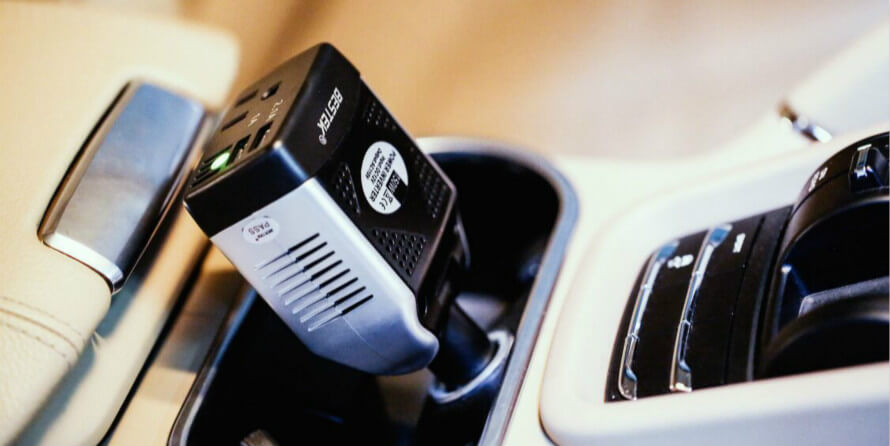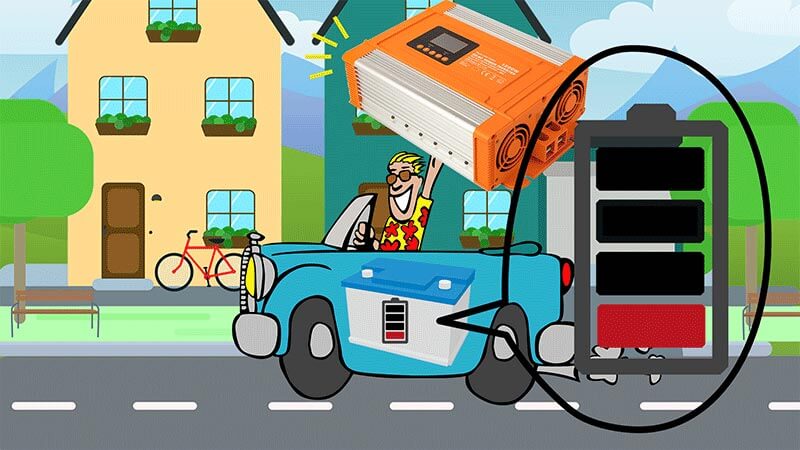Yes, a power inverter can drain a car battery if used improperly. Continuous use without the engine running can deplete the battery.
Power inverters convert DC power from your car battery to AC power for electronic devices. While convenient, they must be used cautiously. Prolonged use of a power inverter without the engine running can drain the battery quickly. This can leave you stranded with a dead battery.
Ensuring the engine is running while using high-power devices can prevent battery drain. Always monitor the power usage and duration to protect your car battery’s health. Proper use of power inverters can provide convenience without compromising your vehicle’s reliability.
Introduction To Power Inverters
Power inverters are essential tools for converting DC power to AC power. They allow you to use household devices in your vehicle. Understanding their function can prevent issues like battery drain.
What Is A Power Inverter?
A power inverter changes direct current (DC) to alternating current (AC). Most car batteries provide DC power. Household devices, however, run on AC power. The inverter bridges this gap.
Inverters come in various sizes. Some are small enough for a car charger. Others are large and can power multiple devices. The basic function remains the same. They provide AC power from a DC source.
Common Uses In Vehicles
Many people use power inverters in cars. They power devices like laptops, phones, and small appliances. This is handy during long trips. You can stay connected and productive.
- Charging laptops
- Running phone chargers
- Powering small appliances
- Operating portable fans
Some inverters can even power larger devices. This includes things like mini-fridges. This is useful for camping or road trips. Always check the power requirements of your device.
Using an inverter correctly is important. It ensures your car battery remains healthy. Misuse can lead to battery drain. Always unplug devices when not in use.
How Power Inverters Work
Power inverters are crucial for converting DC power from car batteries into AC power. This allows you to use household devices while on the road. Understanding how these devices work can help you make informed decisions about their use.
Conversion Process
Power inverters convert DC power from your car battery into AC power. This is done through a series of steps:
- The inverter takes the DC power from the battery.
- It then uses electronic circuits to change it to AC power.
- The AC power is then made available through standard outlets.
This process can be very efficient, but it can also drain your car battery if not managed properly.
Types Of Power Inverters
| Type | Description |
|---|---|
| Modified Sine Wave | Cheaper but less efficient. Suitable for simple devices. |
| Pure Sine Wave | More expensive but very efficient. Ideal for sensitive electronics. |
Modified sine wave inverters are good for basic electronics. Pure sine wave inverters are better for more sensitive devices.
Choose the right type to ensure you don’t unnecessarily drain your car battery.
Impact On Car Battery
Car power inverters are useful. They convert DC to AC power. But do they harm your car battery? Let’s explore the impact on your car battery.
Battery Drain
Power inverters draw power from the car battery. Using high-wattage devices drains the battery faster. This could leave you stranded if the car engine is off. Always check the device’s wattage before use.
| Device | Wattage | Battery Drain Time |
|---|---|---|
| Laptop | 60W | 5-6 hours |
| Phone Charger | 10W | 30-40 hours |
| Small TV | 100W | 3-4 hours |
Low-wattage devices are safer for car batteries. High-wattage devices cause rapid battery drain.
Charging Cycles
Frequent battery drains affect charging cycles. Car batteries have limited charging cycles. More cycles mean shorter battery life.
- Regular use of high-wattage devices reduces battery lifespan.
- Avoid deep discharges to extend battery life.
- Charge the battery fully after each use.
Inverters are handy but can harm car batteries. Use them wisely to avoid battery damage.

Credit: www.bestekdirect.com
Signs Of A Drained Battery
A drained car battery can be a major headache. A power inverter can cause this if used improperly. Knowing the signs of a drained battery helps you act quickly.
Symptoms To Watch For
- Slow Engine Crank: The engine cranks slower than usual.
- Dim Lights: Headlights and interior lights are dim.
- Clicking Sound: You hear a clicking sound when turning the key.
- Battery Warning Light: The battery warning light is on.
- Electrical Issues: Power windows and radio stop working.
Preventive Measures
Preventing a drained battery is easier than fixing one. Follow these steps:
- Limit Inverter Use: Only use the inverter when the car is running.
- Check Battery Health: Regularly check the health of your car battery.
- Install Battery Monitor: Use a battery monitor to track battery levels.
- Disconnect When Not in Use: Always disconnect the inverter when not in use.
| You May Like: Can Power Inverter Damage My Car?
Factors Affecting Battery Life
Using a power inverter in your car can drain the battery. Several factors influence how long your battery lasts. Understanding these factors can help you make informed decisions.
Usage Patterns
How often you use the power inverter affects battery life. Frequent use can drain the battery faster. Running high-power devices, like laptops or TVs, uses more energy. This can shorten your battery’s lifespan.
- Frequency: Frequent use drains the battery quickly.
- Duration: Longer use means more battery drain.
- Device Power: High-power devices use more energy.
Battery Quality
The quality of your car battery also plays a role. High-quality batteries last longer. Cheap batteries may not handle power inverters well. Consider investing in a good battery for better performance.
| Battery Type | Performance |
|---|---|
| High-Quality | Lasts longer and handles power inverters better. |
| Cheap | Shorter lifespan and struggles with power inverters. |
Regular maintenance also affects battery life. Keep the battery clean and check connections. This helps it perform better and last longer.
:max_bytes(150000):strip_icc()/inverter-drain-battery-586327cd3df78ce2c3e891f6.jpg)
Credit: www.lifewire.com
Safe Usage Tips
Using a power inverter in your car can be handy. But it can also drain your car battery. Follow these safe usage tips to keep your battery healthy.
Proper Installation
Proper installation of your power inverter is crucial. Ensure all connections are secure. Use high-quality wires for the connections. Bad connections can drain your battery quickly.
Here is a table to show the best wire gauges to use:
| Inverter Wattage | Wire Gauge |
|---|---|
| Up to 400W | 12 AWG |
| 400-800W | 8 AWG |
| 800-1500W | 4 AWG |
| 1500-3000W | 2 AWG |
Optimal Usage Duration
Do not use the inverter for too long. Long use can kill your battery. Only use it when the engine is running.
Follow these steps for safe usage:
- Start your car engine first.
- Plug in your inverter.
- Use your devices as needed.
- Turn off the inverter before turning off the engine.
Make sure to follow these tips. This will keep your car battery safe.
Alternatives To Power Inverters
Many drivers worry about using power inverters. These devices can drain a car’s battery. Luckily, there are alternatives to power inverters. These options can be more efficient and safer for your car’s battery.
Portable Power Stations
Portable power stations are a great alternative to power inverters. These devices store energy and can power your gadgets. They come with built-in batteries and various output ports.
- USB ports for charging phones and tablets
- AC outlets for laptops and small appliances
- DC ports for car accessories
Portable power stations are easy to carry. They are perfect for camping trips or emergencies. You can recharge them at home, using solar panels, or even in your car.
Solar Chargers
Solar chargers use the sun’s energy to charge your devices. They are eco-friendly and cost-effective in the long run. Solar chargers come in various sizes and capacities.
| Type | Description |
|---|---|
| Small Solar Chargers | Suitable for phones and small gadgets |
| Large Solar Chargers | Can power laptops and other larger devices |
Solar chargers are useful in remote areas. They are ideal for outdoor enthusiasts and travelers. These chargers are also easy to set up and use.
By using portable power stations and solar chargers, you can keep your car battery safe. These alternatives offer efficient and reliable power solutions.
Frequently Asked Questions
Can A Power Inverter Drain A Car Battery?
Yes, a power inverter can drain your car battery. If used while the engine is off, it can quickly deplete the battery.
How Long Can An Inverter Run On A Car Battery?
The duration depends on battery capacity and inverter load. Typically, a 12V car battery can last several hours under light loads.
Should I Turn Off The Inverter When Not In Use?
Yes, turning off the inverter when not in use helps prevent unnecessary battery drain and extends battery life.
Can Using An Inverter Damage My Car Battery?
Continuous use without the engine running can harm the battery. It can lead to deep discharge, shortening battery lifespan.
Conclusion
Using a power inverter responsibly won’t kill your car battery. Ensure your battery is in good condition. Always monitor usage and avoid overloading. Regular maintenance and proper use extend battery life. By following these tips, you can enjoy the benefits of a power inverter without damaging your car battery.

